| Listing 1 - 10 of 2603 | << page >> |
Sort by
|

ISBN: 058534549X 0792397711 Year: 1996 Publisher: Boston, Massachusetts ; Dordrecht ; London : Kluwer Academic Publishers,
Abstract | Keywords | Export | Availability | Bookmark
 Loading...
Loading...Choose an application
- Reference Manager
- EndNote
- RefWorks (Direct export to RefWorks)
Representation and Retrieval of Visual Media in Multimedia Systems brings together in one place important contributions and up-to-date researcg results in this important area. Representation and Retrieval of Visual Media in Multimedia Systems serves as an excellent reference, providing insight into some of the most important research issues in the field.
Multimedia systems. --- Information storage and retrieval systems. --- Information storage and retrieva. --- Computer science. --- Multimedia Information Systems. --- Information Storage and Retrieval. --- Computer Science, general. --- Multimedia information systems. --- Information storage and retrieval.
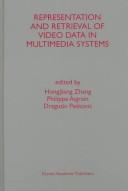
ISBN: 0585317860 0792398637 Year: 1997 Publisher: Boston, Massachusetts : Kluwer Academic,
Abstract | Keywords | Export | Availability | Bookmark
 Loading...
Loading...Choose an application
- Reference Manager
- EndNote
- RefWorks (Direct export to RefWorks)
Representation and Retrieval of Video Data in Multimedia Systems brings together in one place important contributions and up-to-date research results in this important area. Representation and Retrieval of Video Data in Multimedia Systems serves as an excellent reference, providing insight into some of the most important research issues in the field.
Multimedia systems. --- Video recordings. --- Information storage and retrieval systems. --- Information storage and retrieva. --- Computer science. --- Multimedia Information Systems. --- Information Storage and Retrieval. --- Computer Science, general. --- Multimedia information systems. --- Information storage and retrieval. --- Informatics --- Science --- Computer-based multimedia information systems --- Multimedia computing --- Multimedia information systems --- Multimedia knowledge systems --- Information storage and retrieval systems
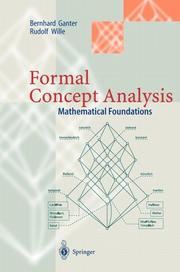
ISBN: 3540627715 3642598307 9783540627715 Year: 1999 Publisher: Berlin : Springer,
Abstract | Keywords | Export | Availability | Bookmark
 Loading...
Loading...Choose an application
- Reference Manager
- EndNote
- RefWorks (Direct export to RefWorks)
This is the first textbook on formal concept analysis. It gives a systematic presentation of the mathematical foundations and their relations to applications in computer science, especially in data analysis and knowledge processing. Above all, it presents graphical methods for representing conceptual systems that have proved themselves in communicating knowledge. Theory and graphical representation are thus closely coupled together. The mathematical foundations are treated thoroughly and illuminated by means of numerous examples. Since computers are being used ever more widely for knowledge processing, formal methods for conceptual analysis are gaining in importance. This book makes the basic theory for such methods accessible in a compact form.
Artificial intelligence --- Comprehension (Theory of knowledge) --- Information theory. --- Lattice theory. --- Logic, Symbolic and mathematical. --- Mathematical models. --- Lattice theory --- Information theory --- Logic, Symbolic and mathematical --- Mathematical models --- Computer science. --- Information storage and retrieva. --- Mathematics --- Physical Sciences & Mathematics --- Algebra --- Théorie des treillis --- Compréhension (Théorie de la connaissance) --- Théorie de l'information --- Intelligence artificielle --- Logique symbolique et mathématique --- Modèles mathématiques --- Information storage and retrieval. --- Information Storage and Retrieval. --- Comprehension (Theory of knowledge) - Mathematical models --- Artificial intelligence - Mathematical models
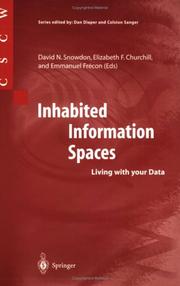
ISBN: 1280189487 9786610189489 1852338628 1852337281 Year: 2004 Publisher: London ; Berlin ; Heidelberg : Springer,
Abstract | Keywords | Export | Availability | Bookmark
 Loading...
Loading...Choose an application
- Reference Manager
- EndNote
- RefWorks (Direct export to RefWorks)
In an era when increasing numbers of people are conducting research and interacting with one another through the internet, the study of ‘Inhabited Information Spaces’ is aimed at encouraging a more fruitful exchange between the users, and the digital data they are accessing. Introducing the new and developing field of Inhabited Information Spaces, this book covers all types of collaborative systems including virtual environments and more recent innovations such as hybrid and augmented real-world systems. Divided into separate sections, each covering a different aspect of Inhabited Information Systems, this book includes: How best to design and construct social work spaces; analysis of how users interact with existing systems, and the technological and sociological challenges designers face; How Inhabited Information Spaces are likely to evolve in the future and the new communities that they will create.
Human-computer interaction. --- Interactive computer systems. --- Computer science. --- Database management. --- Information storage and retrieva. --- User Interfaces and Human Computer Interaction. --- Database Management. --- Information Storage and Retrieval. --- Information storage and retrieval systems. --- User interfaces (Computer systems). --- Information storage and retrieval. --- Data base management --- Data services (Database management) --- Database management services --- DBMS (Computer science) --- Generalized data management systems --- Services, Database management --- Systems, Database management --- Systems, Generalized database management --- Electronic data processing --- Interfaces, User (Computer systems) --- Human-machine systems --- Human-computer interaction

ISBN: 1280206225 9786610206223 0306470330 0792379446 Year: 2000 Publisher: Boston, Massachusetts : Kluwer Academic Publishers,
Abstract | Keywords | Export | Availability | Bookmark
 Loading...
Loading...Choose an application
- Reference Manager
- EndNote
- RefWorks (Direct export to RefWorks)
Multimedia data comprising of images, audio and video is becoming increasingly common. The decreasing costs of consumer electronic devices such as digital cameras and digital camcorders, along with the ease of transportation facilitated by the Internet, has lead to a phenomenal rise in the amount of multimedia data generated and distributed. Given that this trend of increased use of multimedia data is likely to accelerate, there is an urgent need for providing a clear means of capturing, storing, indexing, retrieving, analyzing and summarizing such data. Content-based access to multimedia data is of primary importance since it is the natural way by which human beings interact with such information. To facilitate the content-based access of multimedia information, the first step is to derive feature measures from these data so that a feature space representation of the data content can be formed. This can subsequently allow for mapping the feature space to the symbol space (semantics) either automatically or through human intervention. Thus, signal to symbol mapping, useful for any practical system, can be successfully achieved. Perspectives on Content-Based Multimedia Systems provides a comprehensive set of techniques to tackle these important issues. This book offers detailed solutions to a wide range of practical problems in building real systems by providing specifics of three systems built by the authors. While providing a systems focus, it also equips the reader with a keen understanding of the fundamental issues, including a formalism for content-based multimedia database systems, multimedia feature extraction, object-based techniques, signature-based techniques and fuzzy retrieval techniques. The performance evaluation issues of practical systems is also explained. This book brings together essential elements of building a content-based multimedia database system in a way that makes them accessible to practitioners in computer science and electrical engineering. It can also serve as a textbook for graduate-level courses.
Multimedia systems. --- Information storage and retrieval systems. --- Data structures (Computer scienc. --- Information storage and retrieva. --- Data Structures and Information Theory. --- Information Storage and Retrieval. --- Multimedia Information Systems. --- Data structures (Computer science). --- Information storage and retrieval. --- Multimedia information systems. --- Computer-based multimedia information systems --- Multimedia computing --- Multimedia information systems --- Multimedia knowledge systems --- Information storage and retrieval systems --- Information structures (Computer science) --- Structures, Data (Computer science) --- Structures, Information (Computer science) --- Electronic data processing --- File organization (Computer science) --- Abstract data types (Computer science)
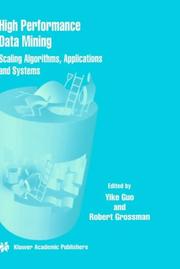
ISBN: 1280205830 9786610205837 030647011X 0792377451 Year: 1999 Publisher: Boston, Massachusetts : Kluwer Academic,
Abstract | Keywords | Export | Availability | Bookmark
 Loading...
Loading...Choose an application
- Reference Manager
- EndNote
- RefWorks (Direct export to RefWorks)
High Performance Data Mining: Scaling Algorithms, Applications and Systems brings together in one place important contributions and up-to-date research results in this fast moving area. High Performance Data Mining: Scaling Algorithms, Applications and Systems serves as an excellent reference, providing insight into some of the most challenging research issues in the field.
Data mining. --- Parallel processing (Electronic computers) --- Data structures (Computer scienc. --- Information storage and retrieva. --- Computer science. --- Data Structures and Information Theory. --- Information Storage and Retrieval. --- Processor Architectures. --- Information storage and retrieval systems. --- Data structures (Computer science). --- Information storage and retrieval. --- Microprocessors. --- Minicomputers --- Information structures (Computer science) --- Structures, Data (Computer science) --- Structures, Information (Computer science) --- Electronic data processing --- File organization (Computer science) --- Abstract data types (Computer science)
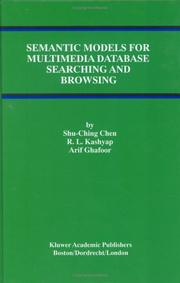
ISBN: 1280206276 9786610206278 0306470292 0792378881 Year: 2002 Publisher: New York : Kluwer Academic Publishers,
Abstract | Keywords | Export | Availability | Bookmark
 Loading...
Loading...Choose an application
- Reference Manager
- EndNote
- RefWorks (Direct export to RefWorks)
Semantic Models for Multimedia Database Searching and Browsing begins with the introduction of multimedia information applications, the need for the development of the multimedia database management systems (MDBMSs), and the important issues and challenges of multimedia systems. The temporal relations, the spatial relations, the spatio-temporal relations, and several semantic models for multimedia information systems are also introduced. In addition, this book discusses recent advances in multimedia database searching and multimedia database browsing. More specifically, issues such as image/video segmentation, motion detection, object tracking, object recognition, knowledge-based event modeling, content-based retrieval, and key frame selections are presented for the first time in a single book. Two case studies consisting of two semantic models are included in the book to illustrate how to use semantic models to design multimedia information systems. Semantic Models for Multimedia Database Searching and Browsing is an excellent reference and can be used in advanced level courses for researchers, scientists, industry professionals, software engineers, students, and general readers who are interested in the issues, challenges, and ideas underlying the current practice of multimedia presentation, multimedia database searching, and multimedia browsing in multimedia information systems.
Multimedia systems. --- Database searching. --- Data structures (Computer scienc. --- Information storage and retrieva. --- Data Structures and Information Theory. --- Information Storage and Retrieval. --- Multimedia Information Systems. --- Information storage and retrieval systems. --- Data structures (Computer science). --- Information storage and retrieval. --- Multimedia information systems. --- Computer-based multimedia information systems --- Multimedia computing --- Multimedia information systems --- Multimedia knowledge systems --- Information storage and retrieval systems --- Information structures (Computer science) --- Structures, Data (Computer science) --- Structures, Information (Computer science) --- Electronic data processing --- File organization (Computer science) --- Abstract data types (Computer science)
Book
ISBN: 3030112268 303011225X Year: 2019 Publisher: Cham : Springer International Publishing : Imprint: Springer,
Abstract | Keywords | Export | Availability | Bookmark
 Loading...
Loading...Choose an application
- Reference Manager
- EndNote
- RefWorks (Direct export to RefWorks)
This book constitutes the thoroughly refereed proceedings of the 15th Italian Research Conference on Digital Libraries, IRCDL 2019, held in Pisa, Italy, in January/February 2019. The 22 full papers and 5 short papers presented were carefully selected from 42 submissions. The papers are organized in topical sections on information retrieval, digital libraries and archives, information integration, open science, and data mining.
Information storage and retrieva. --- Information Storage and Retrieval. --- Information storage and retrieval. --- Information storage and retrieval systems. --- Automatic data storage --- Automatic information retrieval --- Automation in documentation --- Computer-based information systems --- Data processing systems --- Data storage and retrieval systems --- Discovery systems, Information --- Information discovery systems --- Information processing systems --- Information retrieval systems --- Machine data storage and retrieval --- Mechanized information storage and retrieval systems --- Computer systems --- Electronic information resources --- Data libraries --- Digital libraries --- Information organization --- Information retrieval
Book
ISBN: 1493912496 1493912488 Year: 2014 Publisher: New York, NY : Springer New York : Imprint: Springer,
Abstract | Keywords | Export | Availability | Bookmark
 Loading...
Loading...Choose an application
- Reference Manager
- EndNote
- RefWorks (Direct export to RefWorks)
Cultural forces govern a synergistic relationship among information institutions that shapes their roles collectively and individually. Cultural synergy is the combination of perception- and behavior-shaping knowledge within, between, and among groups. Our hyperlinked era makes information-sharing among institutions critically important for scholarship as well as for the advancement of humankind. Information institutions are those that have, or share in, the mission to preserve, conserve, and disseminate information objects and their informative content. A central idea is the notion of social epistemology that information institutions arise culturally from social forces of the cultures they inhabit, and that their purpose is to disseminate that culture. All information institutions are alike in critical ways. Intersecting lines of cultural mission are trajectories for synergy for allowing us to perceive the universe of information institutions as interconnected and evolving and moving forward in distinct ways for the improvement of the condition of humankind through the building up of its knowledge base and of its information-sharing processes. This book is an exploration of the cultural synergy that can be realized by seeing commonalities among information institutions (sometimes also called cultural heritage institutions): museums, libraries, and archives. The hyperlinked era of the Semantic Web makes information sharing among institutions critically important for scholarship as well as the advancement of mankind. The book addresses the origins of cultural information institutions, the history of the professions that run them, and the social imperative of information organization as a catalyst for semantic synergy.
Information science. --- Library science --- Library administration. --- Philosophy. --- Libraries --- Library management --- Management --- Communication --- Information literacy --- Administration --- Organization --- Information storage and retrieva. --- Information Systems. --- Information systems. --- Information Storage and Retrieval. --- Management of Computing and Information Systems. --- Computer Appl. in Arts and Humanities. --- Information storage and retrieval. --- Information storage and retrieval systems. --- Management information systems. --- Computer science. --- Application software. --- Application computer programs --- Application computer software --- Applications software --- Apps (Computer software) --- Computer software --- Informatics --- Science --- Computer-based information systems --- EIS (Information systems) --- Executive information systems --- MIS (Information systems) --- Sociotechnical systems --- Information resources management --- Communication systems --- Information organization. --- Information storage and retrieval --- Organization of information --- Information science --- Information storage and retrieval systems
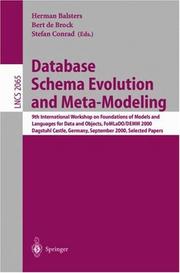
ISBN: 3540422722 3540481966 Year: 2001 Volume: 2065 Publisher: New York, NY ; Berlin : Springer-Verlag,
Abstract | Keywords | Export | Availability | Bookmark
 Loading...
Loading...Choose an application
- Reference Manager
- EndNote
- RefWorks (Direct export to RefWorks)
The Ninth International Workshop on Foundations of Models and Languages for Data and Objects (FoMLaDO) took place in Dagstuhl Germany, Sept- ber 18{21, 2000. The topic of this workshop was Database schema Evolution and Meta-Modeling; this FoMLaDO Workshop was hence assigned the acronym DEMM 2000. These post-proceedings contain the revised versions of the accepted papers of the DEMM 2000 workshop. Twelve regular papers were accepted for inclusion in the proceedings. The papers address the following issues: { Consistency of evolving concurrent information systems { Adaptive speci cations of technical information systems { Change propagation in schema evolution of object-based systems { Evolving software of a schema evolution system { Logical characterization of schema evolution { Con?ict management in integrated databases { Evolving relation schemas { Conceptual descriptions of adaptive information systems { OQL-extensions for metadata access { Metamodeling of schema evolution { Metrics for conceptual schema evolution { Incremental datawarehouse construction In addition to the regular papers, there is an invited paper by Can Turk ¨ er on schema evolution in SQL99 and (object-)relational databases. Acknowledgements: We wish to thank the program committee members for their work on reviewing the submitted papers. We also wish to thank all a- hors for submitting papers to this workshop. Moreover, all participants of the workshop are thanked for contributing to lively discussions. Thanks also to Elke Rundensteiner, who delivered an invited talk on the SERF-project concerning ?exible database transformations.
Database management --- Object-oriented databases --- Computer Science --- Engineering & Applied Sciences --- Computer science. --- Data structures (Computer science). --- Database management. --- Information storage and retrieval. --- Computer Science. --- Data Structures, Cryptology and Information Theory. --- Database Management. --- Information Storage and Retrieval. --- Data structures (Computer scienc. --- Information storage and retrieva. --- Data Structures and Information Theory. --- Data base management --- Data services (Database management) --- Database management services --- DBMS (Computer science) --- Generalized data management systems --- Services, Database management --- Systems, Database management --- Systems, Generalized database management --- Electronic data processing --- Information storage and retrieval systems. --- Information structures (Computer science) --- Structures, Data (Computer science) --- Structures, Information (Computer science) --- File organization (Computer science) --- Abstract data types (Computer science)
| Listing 1 - 10 of 2603 | << page >> |
Sort by
|

 Search
Search Feedback
Feedback About UniCat
About UniCat  Help
Help News
News